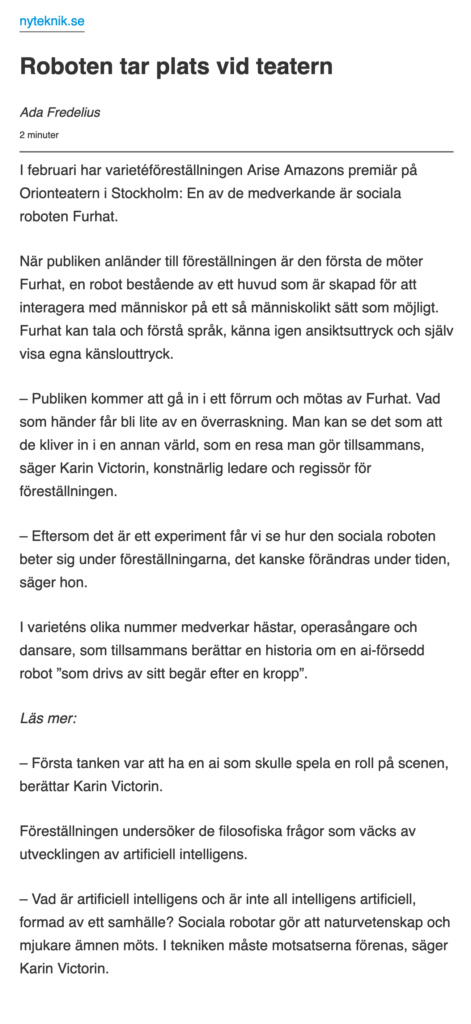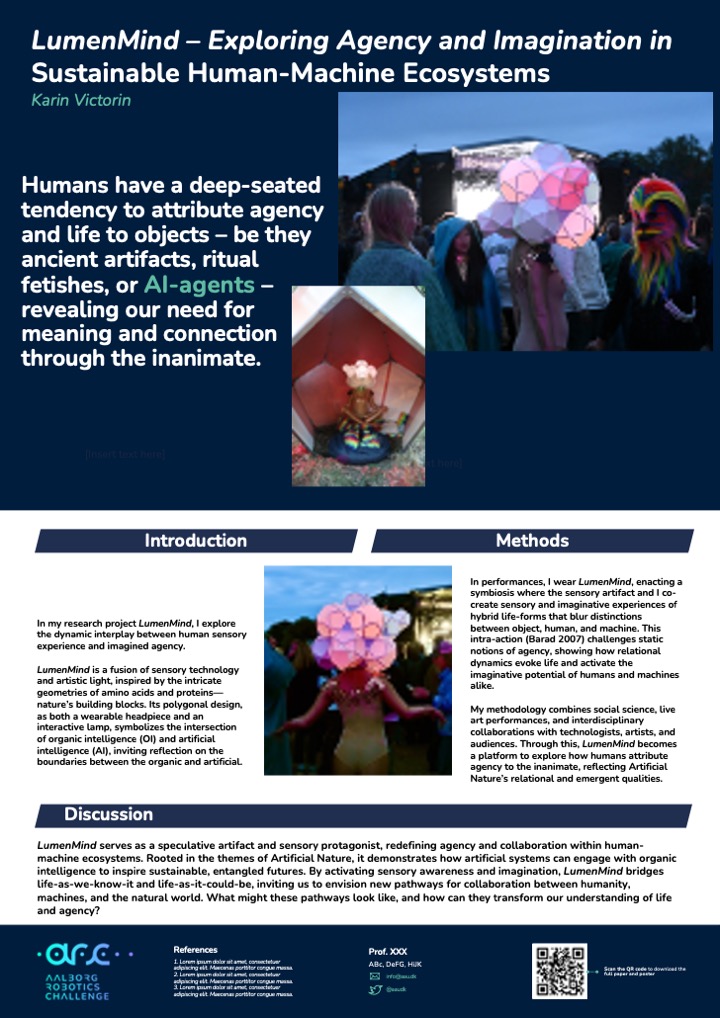Master’s Thesis in Gender Studies, Linköping University 2021:
AI AS GATEKEEPERS TO THE JOB MARKET
A Critical Reading of Performance, Bias, and Coded Gaze in Recruitment Chatbots
Abstract
The topic of this thesis is AI recruitment chatbots, digital discrimination, and data feminism (D´Ignazio and F.Klein 2020), where I aim to critically analyze issues of bias in these types of human-machine interaction technologies. Coming from a professional background of theatre, performance art, and drama,I am curious to analyze how using AI and social robots as hiring tools entails a new type of “stage” (actor’s space), with a special emphasis on social acting. Humans are now required to adjust their performance and facial expressions in the search for, and approval of, a new job. I will use my “theatrical glasses” with an intersectional lens, and through a methodology of cultural analysis, reflect on various examples of conversational AI used in recruitment processes. The silver bullet syndrome is a term that points to a tendency to believe in a miraculous new technological tool that will “magically” solve human-related problems in a company or an organization. The captivating marketing message of the Swedish recruitment conversational AI tool Tengai Unbiased – is the promise of a scientifically proven objective hiring tool, to solve the diversity problem for company management. But is it really free from bias? According to Karen Barad, agency is not an attribute, but the ongoing reconfiguration of the world influenced by what she terms intra-actions, a mutual constitution of entanglement between human and non-human agencies (2003:818). However, tech developers often disregard their entanglement of human-to-machine interferences which unfortunately generates unconscious bias. The thesis raises ethical questions of how algorithmic measurement of social competence risks holding unconscious biases, benefiting those already privileged or those acting within a normative spectrum.
Master’s Thesis in Gender Studies, Linköping University 2019:
PRACTICALLY HUMAN-
Performing Social Robots
and Feminist Aspects on Agency, Body, and Gender
Abstract
Through an experimental theatre play, this thesis explores the development of human-like agency in contemporary “social robot” technology. The entrance point of this study is the gender gap and lack of diversity in contemporary AI/robot development, with an emerging need for interdisciplinary research across robot technology and social sciences. Using feminist technoscience and critical posthumanism as the theoretical framework, this research involves an analysis of a particular social robot case, currently being developed at Furhat Robotics in Stockholm. Inspired by Judy Wajcman (2004), I analyze how socially intelligent machines impact perceptions of human agency, body, gender, and identity within cultural contexts and through interaction. The first part of the empirical research is carried out in the robot lab. The robot is then, in the second part, invited to perform as an actor in a theatre play. Entangled amidst the other players and audience members, a queered agency starts to reveal itself through human-machine “intra-action” and embodiment (Barad 2003). Human-like agency in machines is shown to be a complex matter, drawing the conclusion that human-beings are vulnerable to a myriad of entanglements and preconceptions that artificial intelligence potentially embodies.
The thesis is related to the Project Arise Amazons!
Ny Teknik, Sweden’s largest newspaper with the latest news in technology, interviewed me about the theatre play and our collaboration with Furhat, the social robot from Furhat AB (Published 2017-01-31).

Artificial Nature Transposium
Lightning Talk at Aalborg University, December 2024
“LumenMind–My current research project is a fusion of sensory technology and artistic light, drawing inspiration from the intricate geometries of amino acids– Nature’s building blocks. However, while amino acids are asymmetrical and diverse in their shape, LumenMind’s symmetry reveals its artificial nature. As a wearable head piece, and interactive lamp, its polygonal design symbolizes the intersection of organic & artificial intelligence. Using sensors, it reacts to sound with immersive pulses of light and colors. Much like an OCTOPUS reacting to its surroundings.
What is my method for exploring agency?
In performances, I wear LumenMind on my head enacting a symbiosis where the sensory artifact and I co-create and animate hybrid life forms. Blurring boundaries between object-human-animal–and-machine. I recently performed and Rosendal Garden Party, a big music and art festival in Stockholm.

Dancing in public spaces, I challenge static notions of agency, emphasazing how relational dynamics and intra-action evoke a sense of more-than-human lifeform. Activating the imaginative potential of both humans and technological agents.
My methodology combines elements of social science, live art, and interdisciplinary collaborations with technologists, artists and audiences. Through this approach LumenMind becomes a platform for exploring how humans tend to attribute agency onto the inanimate. I reflect on the interplay between organic and artificial nature!
To summarize:
LumenMind serves as a speculative artefact, and sensory protagonist, aiming to redefine aspects of agency (and collaboration) with human-machine eco-systems. By activating sensory awareness and imagination, it bridges life–as-we-know-it and life-as-it-could-be. It invites us to envision new pathways for collaboration between humanity, AI-agents, and the natural world. What do you imagine these pathways could look like?
More about ANT: https://www.anthub.dk/
